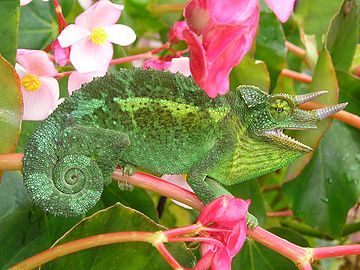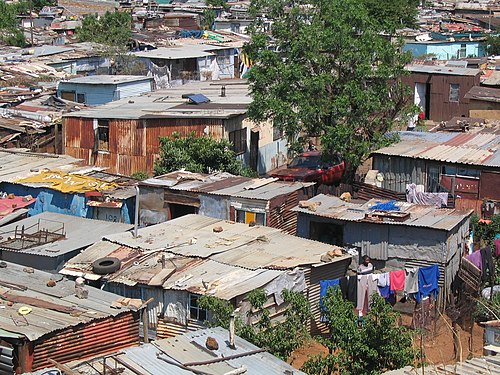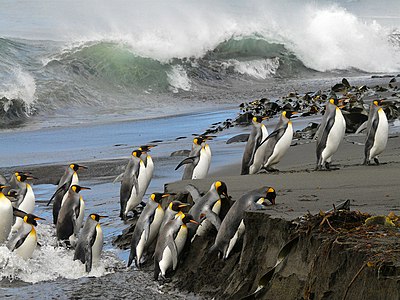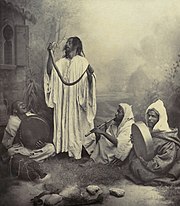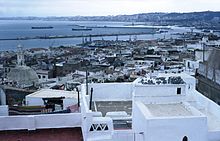Portal:Africa



Africa is the world's second-largest and second-most populous continent after Asia. At about 30.3 million km2 (11.7 million square miles) including adjacent islands, it covers 20% of Earth's land area and 6% of its total surface area. With nearly 1.4 billion people as of 2021, it accounts for about 18% of the world's human population. Africa's population is the youngest among all the continents; the median age in 2012 was 19.7, when the worldwide median age was 30.4. Based on 2024 projections, Africa's population will reach 3.8 billion people by 2099. Africa is the least wealthy inhabited continent per capita and second-least wealthy by total wealth, ahead of Oceania. Scholars have attributed this to different factors including geography, climate, corruption, colonialism, the Cold War, and neocolonialism. Despite this low concentration of wealth, recent economic expansion and a large and young population make Africa an important economic market in the broader global context. Africa has a large quantity of natural resources and food resources, including diamonds, sugar, salt, gold, iron, cobalt, uranium, copper, bauxite, silver, petroleum, natural gas, cocoa beans, and.
Africa straddles the equator and the prime meridian. It is the only continent to stretch from the northern temperate to the southern temperate zones. The majority of the continent and its countries are in the Northern Hemisphere, with a substantial portion and a number of countries in the Southern Hemisphere. Most of the continent lies in the tropics, except for a large part of Western Sahara, Algeria, Libya and Egypt, the northern tip of Mauritania, and the entire territories of Morocco, Ceuta, Melilla, and Tunisia, which in turn are located above the tropic of Cancer, in the northern temperate zone. In the other extreme of the continent, southern Namibia, southern Botswana, great parts of South Africa, the entire territories of Lesotho and Eswatini and the southern tips of Mozambique and Madagascar are located below the tropic of Capricorn, in the southern temperate zone.
Africa is highly biodiverse; it is the continent with the largest number of megafauna species, as it was least affected by the extinction of the Pleistocene megafauna. However, Africa also is heavily affected by a wide range of environmental issues, including desertification, deforestation, water scarcity, and pollution. These entrenched environmental concerns are expected to worsen as climate change impacts Africa. The UN Intergovernmental Panel on Climate Change has identified Africa as the continent most vulnerable to climate change.
The history of Africa is long, complex, and varied, and has often been under-appreciated by the global historical community. In African societies the oral word is revered, and they have generally recorded their history via oral tradition, which has led anthropologists to term them oral civilisations, contrasted with literate civilisations which pride the written word. During the colonial period, oral sources were deprecated by European historians, which gave them the impression Africa had no recorded history. African historiography became organized at the academic level in the mid-20th century, and saw a movement towards utilising oral sources in a multidisciplinary approach, culminating in the General History of Africa, edited by specialists from across the continent. (Full article...)
Selected article –
The Kingdom of Kongo (Kongo: Kongo Dya Ntotila or Wene wa Kongo; Portuguese: Reino do Congo) was a kingdom in Central Africa. It was located in present-day northern Angola, the western portion of the Democratic Republic of the Congo, Southern of Gabon and the Republic of the Congo. At its greatest extent it reached from the Atlantic Ocean in the west to the Kwango River in the east, and from the Congo River in the north to the Kwanza River in the south. The kingdom consisted of several core provinces ruled by the Manikongo, the Portuguese version of the Kongo title Mwene Kongo, meaning "lord or ruler of the Kongo kingdom", but its sphere of influence extended to neighbouring kingdoms, such as Ngoyo, Kakongo, Loango, Ndongo, and Matamba, the latter two located in what is Angola today.
From c. 1390 to 1862, it was an independent state. From 1862 to 1914, it functioned intermittently as a vassal state of the Kingdom of Portugal. In 1914, following the Portuguese suppression of a Kongo revolt, Portugal abolished the titular monarchy. The title of King of Kongo was restored from 1915 until 1975, as an honorific without real power. The remaining territories of the kingdom were assimilated into the colonies of Portuguese Angola, the Belgian Congo, and the Republic of Cabinda, respectively. The modern-day Bundu dia Kongo sect favours reviving the kingdom through secession from Angola, the Republic of the Congo, and the Democratic Republic of the Congo. (Full article...)
Featured pictures –
Did you know (auto-generated) -

- ... that Louise Fulton was the first African American to win a professional bowling tournament?
- ... that after anti-apartheid activist David Rabkin was sentenced to prison in South Africa, he gave the courtroom the clenched-fist black power salute?
- ... that Muhsin Hendricks of South Africa has been described as "the world's first openly gay imam"?
- ... that Kenyan coffee farmer "Pinkie" Jackson amassed Africa's largest collection of native butterflies?
- ... that Gil Scott-Heron's 1975 song "Johannesburg" was banned in South Africa during apartheid?
- ... that on February 3, 1986, African Independence Party leaders Adama Touré and Adama Touré were released from detention?
Categories
Selected biography –
Francis Piol Bol Bok (born February 1979), a Dinka tribesman and citizen of South Sudan, was a slave for ten years and later became an abolitionist and author living in the United States. (Full article...)
Selected country –
 |
 |
|

| ||
Morocco, officially the Kingdom of Morocco (Arabic: المملكة المغربية), is a country in North Africa. It has a coast on the Atlantic Ocean that reaches past the Strait of Gibraltar into the Mediterranean Sea. Morocco has international borders with Algeria to the east, Spain to the north (a water border through the Strait and land borders with two small Spanish autonomous cities, Ceuta and Melilla), and Mauritania to the south.
The full Arabic name Al-Mamlaka al-Maghribiya translates to "The Western Kingdom." Al-Maghrib (meaning "The West") is commonly used. The Latinized name "Morocco" originates from medieval Latin "Morroch," which referred to the name of the former Almoravid and Almohad capital, Marrakech.
Morocco is a de jure constitutional monarchy. The King of Morocco, with vast executive powers, can dissolve the government and deploy the military, among other prerogatives. Opposition political parties are legal, and several have been formed in recent years. (Read more...)
Selected city –
Algiers (/ælˈdʒɪərz/ al-JEERZ; Arabic: الجزائر, romanized: al-Jazāʾir) is the administrative, political and economic capital and largest city of Algeria as well as the capital of the Algiers Province. The city's population at the 2008 census was 2,988,145 and in 2020 was estimated to be around 4,500,000. Located in the north-central part of the country, it extends along the shores of the Bay of Algiers in the heart of the Maghreb region making it classified among the biggest cities in North Africa, the Arab world and the Mediterranean Sea, making it a major center of culture, arts, gastronomy and trade.
The city contains the largest infrastructure facilities in the country; railway and highway connections with neighbouring cities and international links via the Houari Boumediene Airport and Algiers Ferry Terminal. Algiers possesses notable mass transit options, that includes the Algiers Metro, the city's subway system that recorded about 46 million passengers in 2023, alongside the Algiers tramway and several Gondola lift lines helping with the difference in elevation, in addition to many bus lines connecting the suburbs and major population centers. (Full article...)
In the news
- 12 February 2024 –
- Two boats collide on the Congo River near Kinshasa, Democratic Republic of the Congo; with the death toll remains unclear. (AP)
- 11 February 2024 – 2023 Africa Cup of Nations
- In association football, hosts Ivory Coast win their third Africa Cup of Nations by defeating Nigeria 2–1 in the final. Sébastien Haller scores the winning goal in the 81st minute. (The Guardian)
- 10 February 2024 – Somali civil war
- Four Emirati soldiers and a Bahraini military officer are killed, while ten other people are injured, when a soldier opens fire at a military base in Mogadishu, Somalia, before being killed in the ensuing shootout. Al-Shabaab claims responsibility. (AP)
- 10 February 2024 –
- A Eurocopter EC130 helicopter crashes near Nipton, California, United States, killing all the six people on board, including Nigerian banker Herbert Wigwe. (CBS News)
- 10 February 2024 – 2023–2024 Senegalese protests
- Violent protests occur in Senegal following an announcement by President Macky Sall that presidential elections have been delayed from February 25 to December 15. (Sky News)
- 9 February 2024 –
- At least 18 people are killed during a collision between a bus and a truck on a road in Kinshasa, Democratic Republic of the Congo. (AP)
Updated: 16:33, 14 February 2024
General images -
Africa topics
More did you know –
- ...that Iyabo Obasanjo-Bello, a Nigerian Senator from the People's Democratic Party, is the daughter of former President Olusegun Obasanjo?
- ...that the 2007 South Africa miners' strike, which impacted over 240,000 workers, was the first ever industry-wide miners' strike in the history of South Africa?
- ...that Seleh Leha, a town in Tigray Region in northern Ethiopia, was the site of a leprosarium built during the Italian occupation of East Africa and abandoned in 1941?
- ...that Sarir field, an oil field in Cyrenaica operated by the Arabian Gulf Oil Company (AGOCO), is considered to be the largest in Libya, with estimated oil reserves of 12 Gbbl (1.9×109 m3)?
Related portals
Major Religions in Africa
North Africa
West Africa
Central Africa
East Africa
Southern Africa
Associated Wikimedia
The following Wikimedia Foundation sister projects provide more on this subject:
-
Commons
Free media repository -
Wikibooks
Free textbooks and manuals -
Wikidata
Free knowledge base -
Wikinews
Free-content news -
Wikiquote
Collection of quotations -
Wikisource
Free-content library -
Wikispecies
Directory of species -
Wikiversity
Free learning tools -
Wikivoyage
Free travel guide -
Wiktionary
Dictionary and thesaurus








